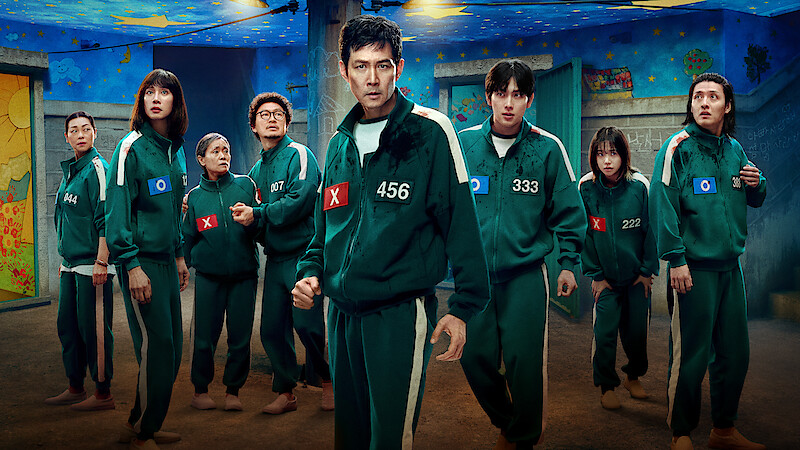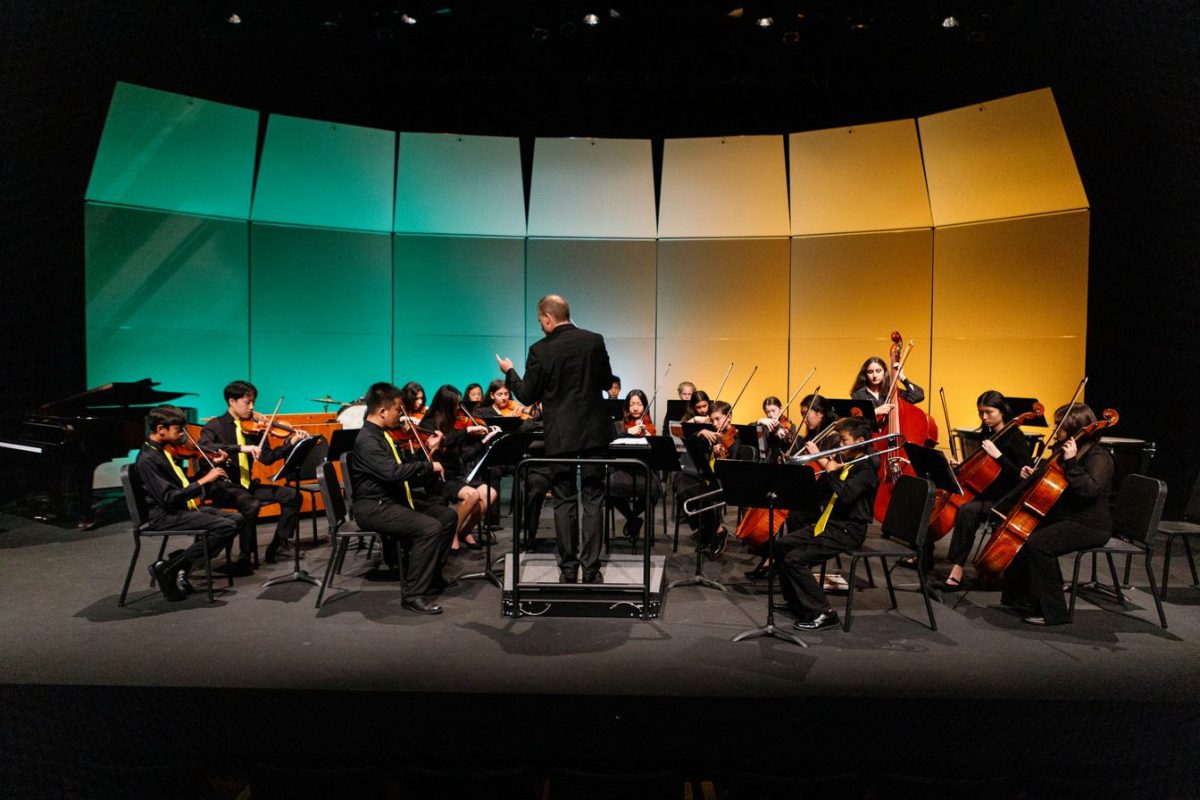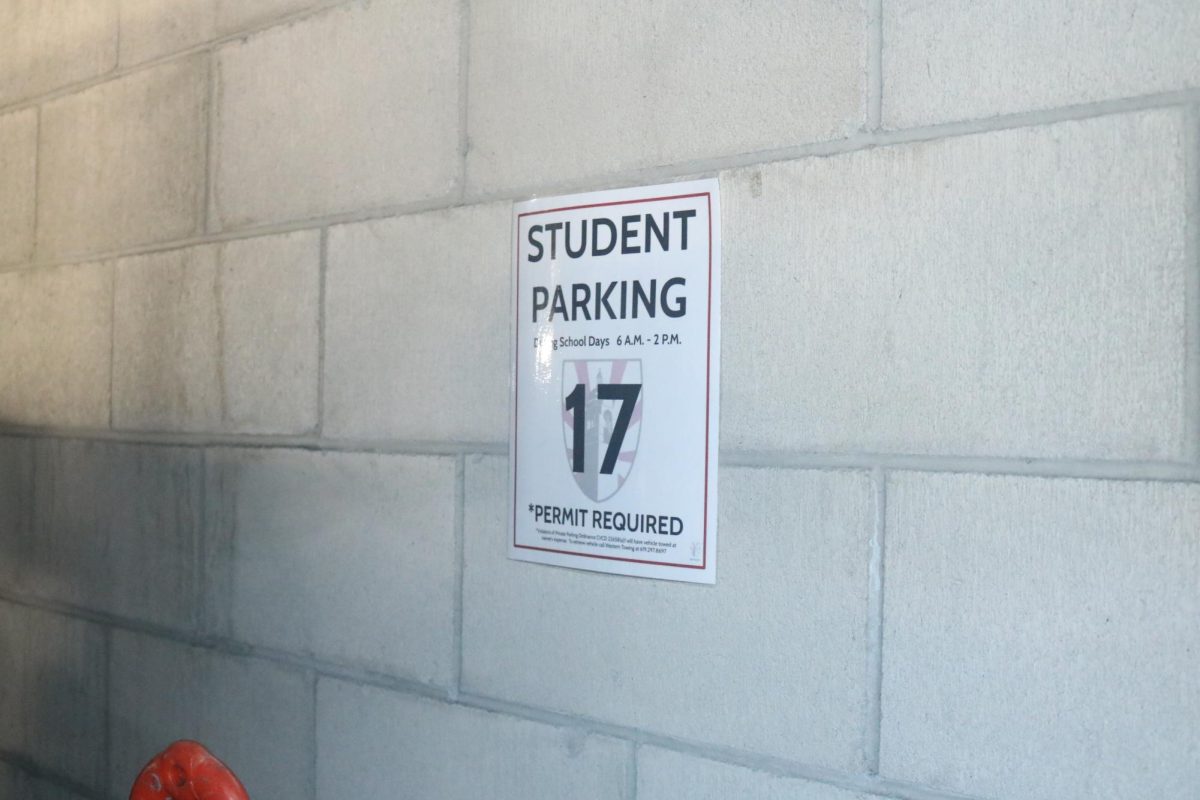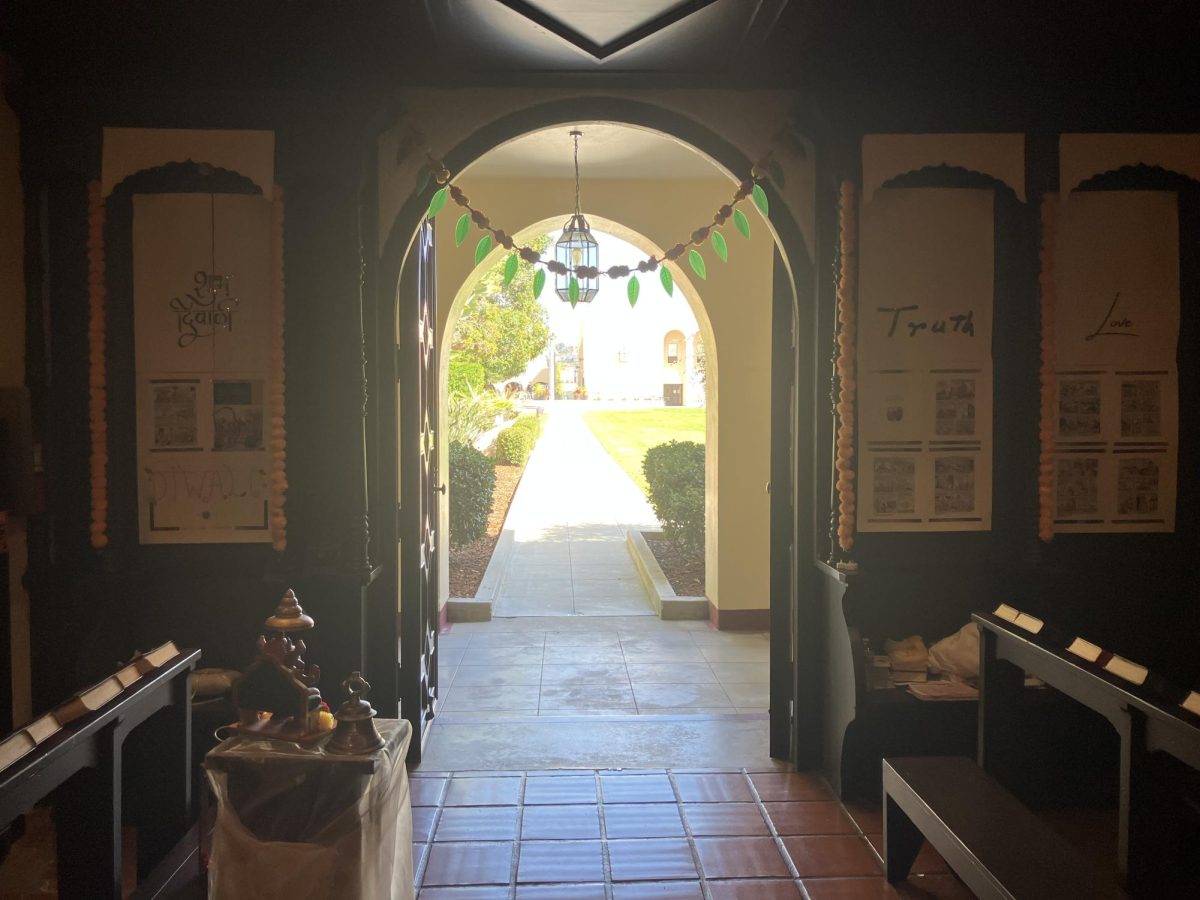The curtains opened to motionless silhouettes illuminated by a dim light, and a dark green glow washed across the stage. Dressed in all black, cast members encircled Beowulf, chanting:
Cumaþ, cumaþ, cumaþ hīeraþ giedd [Come, come, come and hear a tale…]
From loneliness, a hero rises
Cwēðaþ his nama [Speak his name]
Beowulf.
Jackson Weisser (‘26), who played the title role of Beowulf, stood limp in the center, rising slowly to face the audience as the story began to unfold — an original Bishop’s production crafted by months of relentless imagination, creativity, and collaboration.
The tale of Beowulf comes from an Old English poem, whose manuscript was produced between AD 975 and 1025. Performing Arts Department Chair Dr. Kristen Tregar explained, “ It’s a story that’s interesting and one that is really well known. Your English teachers have all read it at some point. Your history teachers have probably all read it. It’s just one of these pieces of literature that is very canonical.” Dr. Tregar chose to adapt it into a play because its hero-versus-monster dynamic “ sort of lends itself to theatricality.”
There was no existing stage adaptation of Beowulf, so Dr. Tregar built the play from the ground up — using just the original old English text, and scholars Seamus Heaney’s and John Ronald Reuel Tolkien’s translations and essays. “It’s really cool that we started with absolutely nothing and now we’re somehow performing this really cool show that’s been received so well,” Abigail Wiener (‘28), who played Ulfgunne, said.
Throughout the creative process, Dr. Tregar knew she wanted the play to be historically accurate “ wherever possible.” Thus, while writing the script over the summer, she worked with Naveen Hernandez (‘26) who, as Jackson explained, was the “dramaturg” of the play, and helped conduct extensive research. “ Often I would tell him, ‘Hey, can you look into ritual practices for Anglo-Saxons and Norsemen, roughly, circa 800?’ And then four hours later, I’d get like nine pages of notes with pictures… He was instrumental. It was a Herculean, or Odin worthy effort,” Dr. Tregar said.
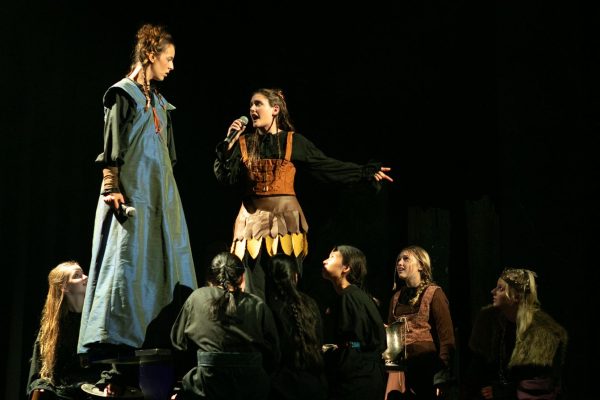
One of the many historically accurate references in the show was a Viking flyting match — structured poetic competitions the Vikings would hold to insult each other. While writing scenes of conflict in the play, Dr. Tregar said, “These were absolutely the kind of moments that, in that period, would’ve been one of these flyting matches.” Dr. Tregar’s friend, Chris Brody, who attended college with Lin Manuel Miranda, helped her write the lyrics for the three rap battles in the play.
Dr. Tregar also made a variety of artistic choices along the way. From the beginning, she knew the monsters in the play should come from the Bishop’s dance program, and she wanted “something that would bring folks from every discipline that we have together.” Abigail added, “We have student musicians performing with us too. It really brings all these different art forms together in a way that has never really happened before, so that’s really cool, and it’s really fun to work with so many different people who are talented at so many different things.”
The nature of writing the play also allowed Dr. Tregar to make changes to the text along the way. “The text wasn’t locked until we’d been in rehearsal for a little while so that I could hear the drafts read out loud and go like, ‘oh yeah, no, that didn’t work,’ or, ‘there’s too many syllables in this line,’” she explained.
Jackson, who has been in every Bishop’s theater production since he was a freshman, explained, “What makes this [production] so unique was that we really went into it knowing nothing of what any of the characters would look like, and what any of the scenes would look like.” Ensemble member Zhizhen Chen (‘29) added, “through the process of rehearsing we were constantly changing and experimenting with things.”
Jackson explained that, because parts of the show hadn’t been fully written yet when they started rehearsals, “it’s really caused me to need to be ready to make changes at any moment.” Zhizhen agreed that this challenge taught her to be “flexible and open-minded.”
The creative liberty also allowed the show’s music composer, Mr. Phil Dannels, to build the songs around the voices that were cast. Jackson said, “The music was written for us, to fit our voices or whoever was cast in it. So that was really cool.” It was a completely new experience for him. “[For] other musicals we’ve done, there’s been at least tracks on Spotify we can listen to or something like that to practice. This one was all written by our amazing music director, Phil Dannels, and we kind of had to just learn it,” he described.
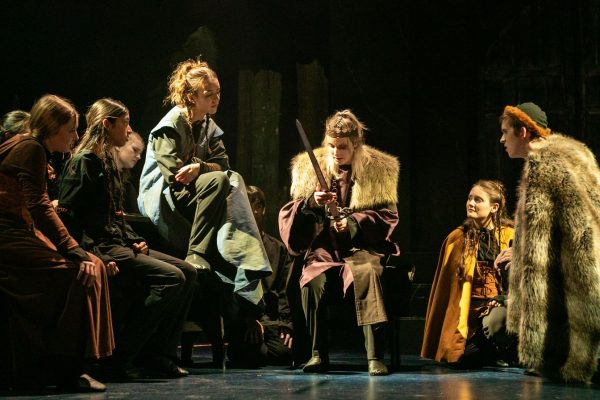
Zhizhen added that the creative process brought the cast together. “Some of the choreography was being tweaked even during tech week. However, the people around me all responded with positivity and immediately adapted to the given advice. This moved me to also do the same,” she said. Jackson continued, “I remember our first time on the stage with the lights, everybody was so into it. We all connected as a community and were having a really fun time with this show that we were creating. It was just beautiful and I guess is the only word I could say to describe it. And that level of energy was just awesome.”
Performing Dance Group (PDG) member Emma Li auditioned for Beowulf when she heard Dr. Tregar was looking for dancers; it was her first theater production at Bishop’s, and she noted, “The most exciting part of being part of the production was the people. The theater community is by far one the most welcoming communities I’ve ever come across at Bishops. It’s super laid back and most of the time it’s really silly. There’s something very special and raw about watching people’s characters develop.”
Zhizhen concluded, “I hope that the audience takes away two things from this show. The first is the message of the story of Beowulf: that as long as we are just and fight for good, the future will remember us. Second, is to be bold. This production was shaky at first, and we all had concerns. But because Dr. Tregar, Phil, Sam, the whole crew and people who helped, believed in this show, it was able to become something beautiful.”



![Jackson Weisser (‘26), who played the title role of Beowulf, explained, “This adaptation specifically portrays Beowulf as having selfless motivations for a lot of his actions, and I think that's really powerful. Being more so a good person than a super physically intimidating person needing to fight all the time, is what I [want the audience to take away] from my performance of the character.”](https://thebishopstower.com/wp-content/uploads/2025/10/Beowolf26_047.jpg)
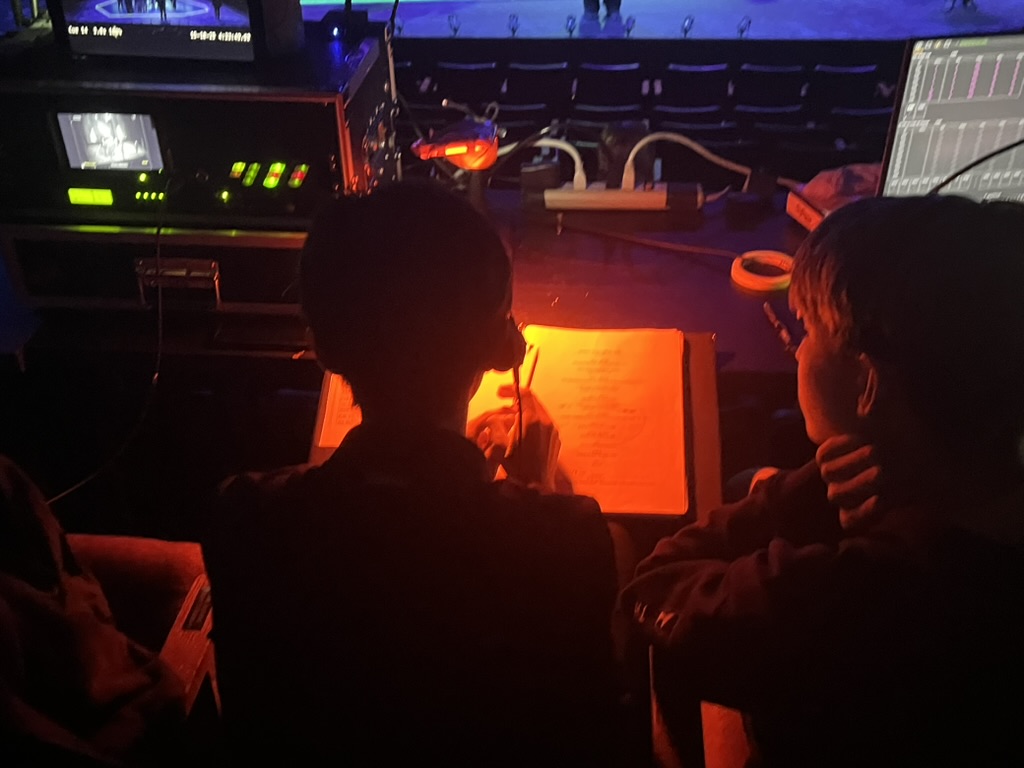
![Leia (‘30) and Sara Park (‘32) ended their combative performance with a yell known as a kiyap. Leia explained with a proud smile, “I realized this when I was little, but not many people see taekwondo every day. For me, it’s a daily occurrence, so it feels very normal…when I do [a performance] in public, everyone’s like ‘Wow, that’s really cool’. So it always reminds me how this isn’t a normal thing in other people’s lives and I think it’s really cool that I can share that.”](https://thebishopstower.com/wp-content/uploads/2025/10/Screenshot-2025-10-02-at-2.07.47-PM.png)
